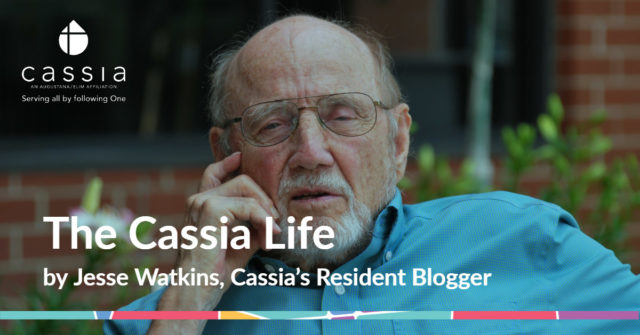The Cassia Life
By Jesse Watkins, Cassia’s own resident blogger
Nothing brings out the very best in us quite like taking care of someone we love. Often, when the basics of good care have been fully met, we go the ‘extra mile,’ sometimes adding multiple dimensions of energy-burning, time-consuming care hours.
While some of us take it too far for our own good, what I’m talking about here is the care provider whose extra mile includes taking extra good care of self, in part to be more able to provide care overall.
My own experience in care has been both, at different times, a recipient and a caregiver. The first, in reflection, seemed easy enough. One must maintain awareness of the incoming blessing. It’s called gratitude. My view is that gratitude needs to be felt inwardly and declared, aloud or written, and the functional words are “Thank you.”
On the caregiving side of this gold coin I was the major care provider for several years for my wife Patricia, who passed in the summer of 2017.
Moving on, in early October I had the good fortune to visit Elim Shores in Eden Prairie, Minnesota, an assisted living Cassia community. Housing director Chris Orr set up several visits with residents, including Sue Jakubowski , 76, and Doreen Kloth, 88. Both mentioned care by the Elim Shores staff as an important quality aspect of fulfilling needs. Beyond that, their adult children were overseeing mother’s care and providing care hands on.
Sue’s daughter Terry visits her mother regularly. “She works full-time, yet when I need her she’s here in a heartbeat,” says Sue. “When I don’t need help she leaves me alone.
“She’s my primary family caregiver, I think because of the mother/daughter connection we had when she was growing up. We communicate. Sometimes we talk while also doing other things and sometimes we just sit and gab. She’s a counselor for me.”
Sue also has two sons who live nearby and a son in Seattle. “I do wish all my adult children would visit more often, maybe just pop in for an hour or so. But they are all professionals and are very, very busy, and they have families of their own.
“When you become the grandparent you have to step back. That’s just the way it is, the nature of it.”
Elim Shores resident Doreen Kloth is fortunate to have a social worker in her family–her daughter Laura, who visits twice a week, and helps coordinate Doreen’s care with staff. “Laura checks on things that a social worker would know about and makes sure that I am doing well,” explains Doreen.
“Paul does mechanical and financial things, visiting as needed, but I still manage my own checkbook. We do family things together, too. For example, we had planned a hot air balloon ride for today, but the high humidity caused a cancellation. We plan to reschedule.”
Peggy Gaard, Cassia’s director of Open Circle, which provides caregiver support, spoke to the idea of what caregivers might actually do when providing an “extra mile” of service: “They take time to nurture by focusing on purposeful tasks, doing WITH instead of FOR care receivers. Caregivers often feel overwhelmed by all the tasks they are responsible for and tend to complete tasks FOR the care receiver because it is faster and may be less complicated. Those caregivers who have discovered that allowing these tasks to be completed in a partnership often see more satisfaction from their loved one and feel more fulfilled as a caregiver, too.
“They put great effort into respecting the identity of their loved one. They focus on little things, dressing in a style that represents who that person has been throughout their lives, professionally and personally, maintaining relationships with friends and family by adapting the familiar activities that they have been engaged in throughout their lives. Keeping their strengths and interests alive helps them feel connected to the larger community outside of their homes.”
The care receiver’s responsibility beyond gratitude is well stated by Sue Jakubowski at Elim Shores: “Along with receiving care, she gives it. I have to know very clearly in my mind what is the best thing for me, then for my family. Once I have that figured out it’s up to me to embrace an attitude that’s giving.

